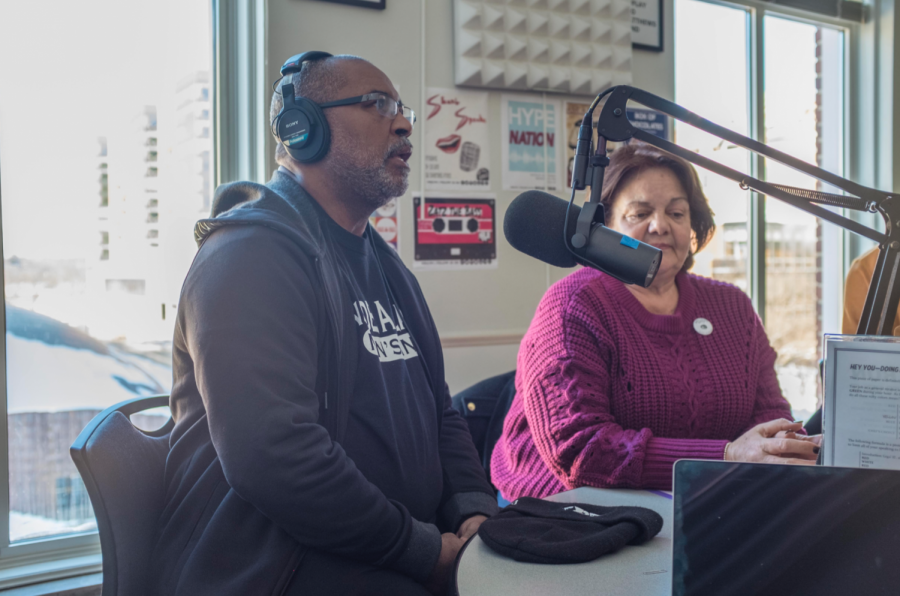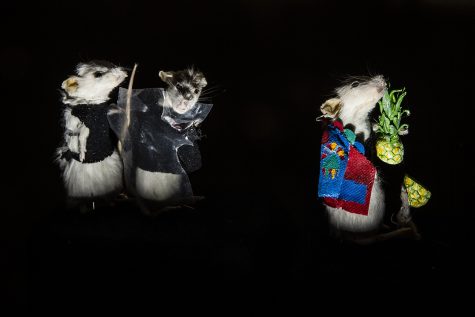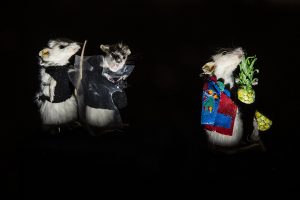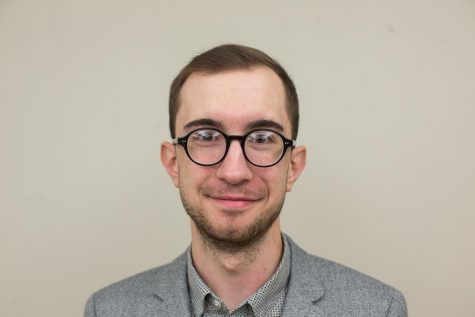Infiltrating the KKK: Ron Stallworth’s story
Ron Stallworth describes how he infiltrated the KKK as the first black police officer in Colorado Springs.
Ron Stallworth talks on the radio on Wednesday. Stallworth, whose book *Black Klansman* was adapted into a Spike Lee film, discusses his time as a police officer and his infiltration of the KKK.
January 24, 2019
A man stands on the stage, his dark skin illuminated with blue light, his T-shirt proclaiming “Inside a Black Man’s Mind.” Instead of standing behind the podium, he stands beside it, leaning casually toward the mic with a hand on his hip. His stance is powerful and strong, his voice, welcoming and kind.
“Where is my wife?” he asks, scanning the crowd and shading his eyes. His face relaxes into a smile as she raises her hand from the front row, and he gives her a wave. Then, he leans toward the mic to begin the true story of how he, as a black man, joined the Ku Klux Klan.
On Jan. 23 at 7:30 pm, Ron Stallworth, a former detective and the author of BlacK Klansman, spoke at the Englert, 221 E. Washington St.. He delivered his story of infiltrating the KKK as an undercover detective and then, how his story became a bestselling book and, eventually, a movie with six Oscar nominations.
Stallworth said that, on a whim, he responded to a newspaper ad inviting new members to the Colorado Springs chapter of the KKK.
“I figured what the hell,” he said. “I wrote the letter, and it was very simple. I signed it, put it in the mail, and forgot about it. I always get asked what was the scope of your plan for this investigation. There was none. We didn’t know what we were walking into. Who are these guys, what is their purpose, why are they here?”
To his great surprise, he received a call from Ken O’Dell, the local KKK organizer.
“I called him back, pretending to be me,” Stallworth said and laughed. “Sounds like a movie, doesn’t it?”
Stallworth then went through the rigorous process of persuading his superiors to allow him to lead the investigation — which wasn’t easy, given the circumstances. He had given his true name to O’Dell, during what he called “a moment that could only be described as a brain-freeze.” Thus, he would need help from another undercover cop that could pose as Ron Stallworth at KKK meetings.
“I had to have a white officer become my avatar,” Stallworth said. “I get asked, why did you not turn this over to your avatar? I didn’t turn it over because it was my investigation.”
Playing double was no easy feat however.
“Chuck and I” he said, referring to the alias of the white officer who physically went to the meetings as Ron Stallworth, “had to maintain a conversational flow. He knew what I said, I knew what he said. I might have had a call at 8 and then had to brief him for an 8:15 meeting. Every meeting, every phone call, we kept this up over a seven-month period of time.”
This story is intriguing to say the least, and holds good entertainment value (as proven by the highly popular book and movie). However, beneath the humor of the situation were much darker tensions.
“If you see the movie, they are all bumbling idiots,” Stallworth said. “I always thought, if this is an example of what white supremacy is, we’ve got nothing to worry about. I knew they had full intent, though, to cause harm. They told me that they were going to bomb the two gay bars in town. They had the full capability to pull the bombing off, with numerous members having worked with explosives before. Many of them carried concealed firearms.”
Stallworth successfully headed the investigation despite the pressure of the situation and that he was the first black officer in the Colorado Springs police. He even went so far as to contact the head of the Ku Klux Klan himself, Grand Wizard David Duke, when he hadn’t received his membership card in a timely manner.
“That [membership] card I had, David Duke put together himself and sent it through the mail,” he said. “We started talking on the phone numerous times a week. We talked about his family, his wife. He was a nice guy, smooth, the kind of guy you’d want your daughter to take home. But when he started talking about race, he was a monster.”
Stallworth had leader of one of the most infamous white supremacist groups fooled, however.
“When I planted a seed in his mind that I was a white supremacist,” he said. “He fought his own senses to believe me. That’s the thing about good undercover work. If you have a strong story at the beginning, they will fight themselves to believe you.”
And the information he received from his risky investigation was well worth it.
“We warned other cities about planned marches,” Stallworth said. “One day, David Duke said, ‘You know, it was like someone knew we were coming or something.’ Members of the KKK would arrive at marching destinations and be met with police forces nationwide.”
Finally, the icing on the cake, was when Duke himself came to visit Colorado Springs.
“The investigation came to a head when David Duke came to Colorado Springs for a political campaign,” Stallworth said. “They needed him to be guarded as a VIP person, and I was assigned because I was the only one available. I said to him, ‘I’m a detective, and I’ve been assigned to guard you. I don’t agree with your philosophy, but I’ll do everything in my power to make sure you get out of this city alive.’”
While guarding Duke through the political campaign, Stallworth certainly got the last laugh.
“I stood by the Colorado grand dragon and David Duke,” Stallworth said. “I threw my arms around their shoulders right as the undercover Ron Stallworth took our picture. David Duke tried to grab the picture from my hand and I said ‘If you put your hand on me, I will put you in jail for assault on a police officer.’ He didn’t know what to say and quickly walked off.”
The rewards of Stallworth’s efforts weren’t necessary concrete but were certainly effective.
“People ask me, ‘What did you accomplish? Who did you arrest?’ We arrested nobody,” Stallworth said. “I could have put them away for the misdemeanor of concealed-weapon carriage, but I wanted them for felonies, and they slipped away. But, I prevented three domestic acts of terrorism in the forms of cross-burning and identified two secret NORAD (North American Aerospace Defense Command) personnel with access to nuclear weaponry who were KKK members in Colorado Springs.”
“We connected the dots between the American Nazi Party and the Ku Klux Klan and other white supremacy idiots. I know what I had done was unique,” he said. “That is why I still have my membership card in my wallet. That is why I wrote the book.”
And his impact continues today, as he tells his story to the students of America, sharing the importance of education and standing up for what is right.
“This story is coming to screens at a critical time in political history,” Stallworth said, addressing the younger members of the audience. “Vote that idiot out of the White House. Young people need to vote. When someone tells you you can’t do something, and you know your path is true, follow that path. Don’t let them say no.”





















